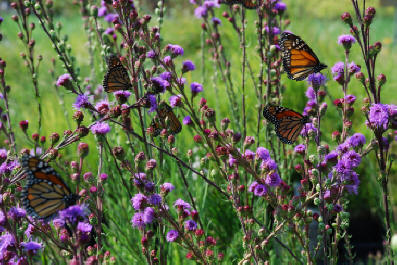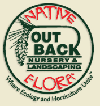NO systemic insecticides used in/on our plants!
Topical treatments limited to bird appetites, mild soap, and/or wildlife-safe horticultural oils.
30/30 Wildflower Cart Sale!
Regularly-priced wildflowers, grasses, sedges, & ferns discounted 30% when you purchase 30 or more items.
Mix & Match! Yes, your shrubs and trees count towards your 30 items!
Discount limited to horticultural container size #1. Retail only. Plants must be purchased as a single transaction.
Got a Lawns To Legumes Grant? You'll get an itemized receipt with all the species names.

Check back regularly for new specials and announcements.
Stop in for additional in-store special markdowns!
Planting Suggestions
A container grown plant will suffer little, if any, transplant shock when planted properly. Please follow these steps to help ensure successful planting:- Dig a hole that is twice as wide and the same depth as the root ball (container). For hard plastic pots:
- Remove the plant from the container. If the plant doesn't remove easily, carefully cut the container open.
- To help the roots establish themselves, scarify or cut the root ball vertically on four sides and on the bottom. (Approximately 15% of root ball width). This stimulates outward growth of the roots. Use a serrated knife, pruner, spade, etc.
- Place the plant in the hole so its crown is at ground level.
- Place the plant, with bag, in the hole so its crown is at ground level.
- Slice the fabric bag down four sides with a sharp knife. Remove the fabric sides or roll them down into the hole, below the ground surface.
- The bottom of the grow-bag can be left in the hole; the plant will root though/around it. Fabric pots naturally encourage air-pruning of the root ball, helping reduce circled and girdling roots.
- Backfill the sides of the hole with soil and saturate both the root ball and surrounding backfill with water.
- New plantings should be watered as needed. Physically check the moisture level by placing your thumb about 1" into soil. If the soil is moist, moisture is adequate. Over watering kills plants. Be aware of how lawn irrigation systems may affect your new plantings.
- We highly recommend mulching. Mulch suppresses weeds, holds moisture, evens temperature extremes, and builds the soil.
Terminology
Light:
- Full sun: Direct light all day.
- Part shade: Direct light for six to eight hours.
- Filtered light: Light under a tree canopy can reach the ground.
- Shade: Light under a tree canopy cannot reach the ground.
Soil Moisture:
- Wet: Soils are moist during most of the year.
- Wet-Mesic: Excessively wet during spring or after heavy rainfalls; often dry during the summer season.
- Mesic: Moderately moist; water soaks into soils without run-off.
- Mesic-Dry: Well-drained.
- Dry: Excessively drained.
Soil pH:
- Calcareous: Plant requires alkaline soil pH of 7 to 8.
- Acidic: Plant requires acidic soil pH of 4 to 6.
Growth & Flowering Habits:
- Aggressive: Plant may spread by seeds or roots or other vegetative means.
- Rhizomatous: Spreads by creeping horizontal underground stems.
- Cool season: Plant growth occurs during the spring & autumn season when soil temperatures are cool.
- Warm season: Plant growth occurs during the summer when soil temperatures are warm.
- Dioecious: Plant bears male & female flowers on separate plants; only the females produce fruit/seeds and only the males produce pollen.
State License
Out Back Nursery, Inc. is licensed by the Minnesota Department of Agriculture as a Nursery Stock Grower and is inspected on an annual basis. License #20014223.
Container Grown
Container grown is a plant which is "rooted in" a container and is actually growing there: not a "potted" or "containerized" plant, which is a bare root plant recently placed in a container with growing media. When a container grown plant is planted properly, it quickly acclimates to its new environment and will continue to develop its roots and shoots, virtually eliminating maintenance and replacement costs.
Sources
Our native plants, naturally occurring in the river bottoms, flood plains, prairies, woods, and savannas of the Twin Cities Region, are at this time from seed or cutting sources within 300 miles of the our nursery, with rare exceptions noted. Most are from sources in the local area. We are committed to providing plants that are regionally specific. Contact us for information on contract growing site-specific plants.
Catalog
Our catalog includes a Retail (open market) Price List. We also offer wholesale pricing intended for use by those licensed in growing and selling of nursery products, and qualifying non-profit organizations. The most current price list available will cancel all previous lists. Prices are subject to change without notice. All prices quoted are F.O.B. Out Back Nursery, Denmark Township, MN.

